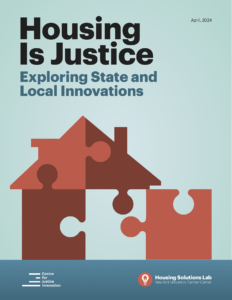Housing insecurity and justice system involvement can be a vicious cycle with long-lasting effects for individuals, families, and communities as well as government systems. This report, created in collaboration with the Housing Solutions Lab at New York University’s Furman Center, explores ways that actors in the justice system and housing agencies can partner to break this harmful cycle. Through a national survey and 32 individual interviews with practitioners in diverse places, as well as a scan of over 50 programs, the paper compiles innovative policies and programs that exist to bring more safe, stable housing to people at various stages of legal system involvement. The report recognizes that cross-system collaborations are hard and also explores the elements that made these partnerships successful.
The report finds that in diverse places across the country, housing and justice system practitioners are working together to design solutions. The four types of innovative approaches include:
- Preventing criminal justice involvement: These are efforts like pre-arrest diversion and decriminalizing homelessness, that limit housing instability and reduce justice system involvement.
- Connecting people early to resources: Early needs assessment and engagement regarding housing instability in the criminal legal process can make a real difference, like what happens in many community courts that take a holistic approach to engagement.
- Expanding access to housing: These efforts remove barriers to housing and prioritize justice-involved people for existing housing. There are examples of both happening in local administration of federal housing programs.
- Increasing housing supply: New housing supply needs to be part of the ultimate solution, and there are creative innovations happening to achieve this for justice-involved people. But, new housing is not the only answer.
When goals are aligned; stakeholders are engaged early and often; individual relationships fostered; and the right team, including people with experience in the systems at issue, is in place, housing and justice system collaborations can succeed. Individual stability and health, community safety, and decarceration efforts depend on breaking the harmful cycle between housing instability and justice involvement.
For more information about the Center’s work supporting housing/justice system collaborations, please contact Jessica Yager at jyager@innovatingjustice.org.
